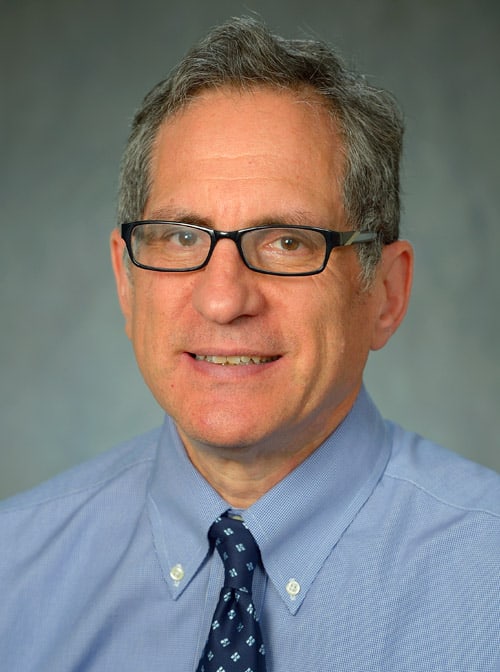
The progress in how breast cancer is diagnosed and treated is due in no small part to the dedication of scientists, doctors and advocates worldwide, all committed to a future without breast cancer. In particular, the remarkable research conducted by David Mankoff, Ph.D., M.D., is opening a new understanding of diagnostic imaging for breast cancer.
Dr. Mankoff, Vice Chair for Research, Radiology and the Matthew J. Wilson Professor of Radiology at the University of Pennsylvania and Associate Director of Education and Training at Penn’s Abramson Cancer Center, has been pioneering more advanced imaging techniques, such as positron emission tomography (PET).
“We use radioisotopes mostly for diagnostics, and more recently, increasingly for therapy,” Dr. Mankoff explained. “My research focuses on this particular type of imaging, which is a form of something more broadly called molecular imaging. Molecular imaging has the ability to both find cancer and characterize it, and thus the ability to guide treatment and to evaluate the response to treatment.”
These sophisticated tools offer a deeper, more comprehensive view of breast cancers, especially for locally advanced or metastatic breast cancer, painting a clearer picture of the extent and characteristics of cancer.
“We are using these specialized techniques to image the biology of these breast cancers,” Dr. Mankoff said. “In doing so, we can use the abnormal features of cancer cells — for example, using too much sugar — as a way to find tumors that would otherwise be hard to find with standard methods.”
One of the most exciting aspects of Dr. Mankoff’s work lies in the potential for personalized treatment.
“The ability to look at breast cancer biology allows us to use imaging, especially in more advanced cases, to help choose therapy and direct therapy, and then to evaluate relatively early on whether it’s working or not,” Dr. Mankoff said. “This falls into the category of precision oncology, i.e., treating individual patients based upon their personal characteristics and the characteristics of their tumor. This is, I think, one of the leading-edge technologies that can be an important part of individualized breast cancer treatment.”
Dr. Mankoff’s research is not only changing how we image breast cancer, but it’s also expanding our knowledge of tumor biology.
“One exciting finding in these areas relates to tumor metabolism, which is something I focused a lot of my research on with Komen’s support over the years.” Dr. Mankoff explained. “Right now using PET, we mostly image glucose consumption, which is generally elevated in cancers, including breast cancers. However, we know that tumors don’t feed just on glucose. We’ve been looking at other sources of fuel to better understand breast cancer biology and some patterns of resistance that were originally identified from the studies that we’ve done with PET glucose imaging. We are particularly focused on the importance of metabolism of the amino acid, glutamine, in contributing to breast cancer progression and therapeutic resistance, especially for TNBC.”
Dr. Mankoff’s invaluable contributions to the field of diagnostic imaging and breast cancer are a testament to the power of innovation, dedication and a collaborative spirit. He acknowledges the role that Komen plays in fostering collaboration among various stakeholders in the fight against breast cancer.
“I want to compliment Komen for bringing together the breast cancer community of patients, physicians and investigators,” Dr. Mankoff said. “I’ve met the most interesting and diverse patients that I’ve ever met in my career. Komen also brings together a community of scholars to interact in a multidisciplinary fashion.”
Komen’s support extends beyond just funding to actively creating an environment where specialized research, like Dr. Mankoff’s, can be integrated into a broader, multidisciplinary context.
“Breast cancer is a disease that brings researchers that are very specialized and experts in an area of niche research into a larger community so that our research can be integrated into the process,” Dr. Mankoff explained.
In a field as complex and challenging as breast cancer, fostering a collaborative community of patients, physicians and researchers is crucial.
“I think one of the nice things about the breast cancer community of patients and physicians and researchers and what Komen does in support, is it really is a community. I think that’s what it’s going to take to cure this disease,” Dr. Mankoff said.



